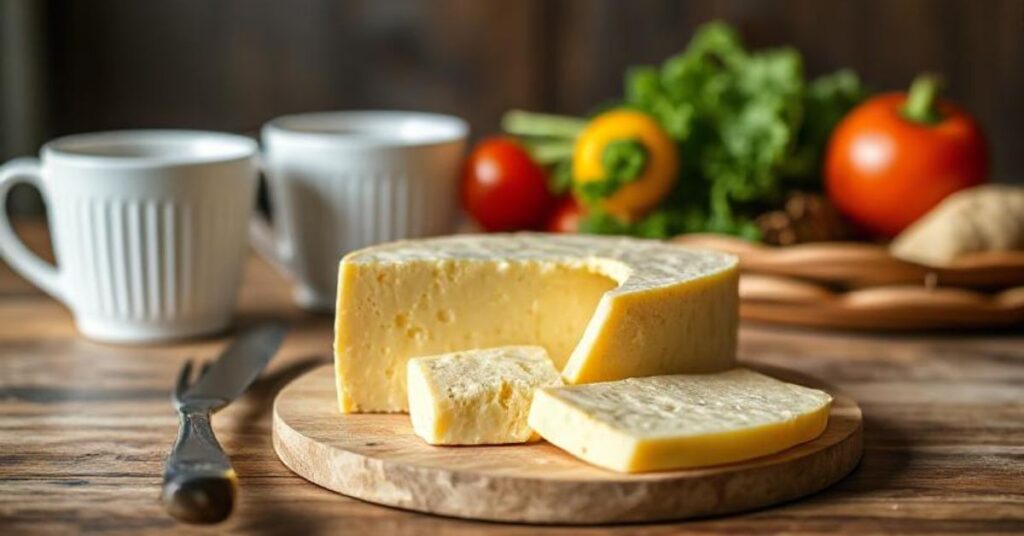Parmesan cheese, or Parmigiano Reggiano as it’s known in Italian, is a hard, granular cheese from the provinces of Parma in Northern Italy. It’s a cheese I’ve always loved to sprinkle over many dishes, from pasta to pizza.
However, for those who follow Islamic law, there are often worrying comments and disputes about whether this cheese can be considered halal or if it’s haram. It’s essential to understand that this cheese is traditionally derived from cow’s milk and often uses microbial rennet in its production.
This can lead to confusion about whether Parmesan cheese fits the criteria for halal or not. Ultimately, this article will explore how Parmesan cheese, with its origins in Italian craftsmanship, raises important questions about its halal status under Islamic law.
Is Parmesan Cheese Halal? Quick Summary
Since parmesan cheese contains animal-derived rennet, which may come from animals not slaughtered according to Islamic law, it creates concerns for Muslim consumers. Moreover, while Islamic law explicitly prohibits certain items like pork and alcohol, determining the halal status of products like parmesan cheese is more complicated. This is due to the uncertainty surrounding ingredients such as animal-derived rennet, which raises questions about whether they can be considered halal.
So, How Is Parmesan Cheese Made?

Parmesan cheese has a long history, with its origins tracing back to Benedictine monks over a millennium ago in the regions of Italy, specifically Reggio Emilia. The process begins with cow’s milk, which is curdled using a special enzyme called rennet.
This helps separate the whey from the curd, leaving behind the solid portion that will eventually form the cheese. The curds are then molded into large wheels and left to age for an extended period, allowing the cheese to develop its signature sharp, salty flavor and firm texture.
The production process follows strict guidelines, ensuring the authenticity and high quality of the Parmesan cheese produced. Only certain regions of Italy are authorized to produce this famous hard cheese, and these areas continue to use time-honored techniques passed down through generations.
The Parmesan cheese is aged and salted, creating a delicious and savory result that reflects the dedication and tradition behind its creation. The entire process, from the separation of the curd to the aging of the cheese, ensures a product that’s both authentic and full of rich flavor.
You Might also like: Is Venison Meat HALAL?
What Are The Different Types of Parmesan Cheese?
When it comes to Parmesan cheese, there are a few variations that you might come across, especially in the European Union. The most famous is Parmigiano Reggiano, which is protected by strict production guidelines. This authentic cheese comes with a unique identification number that indicates its origin and ensures it adheres to rigorous standards.
This cheese has a distinct nutty flavor and a crumbly texture, making it a favorite for many chefs and connoisseurs around the world. Another common variety is Parmesan, while in some regions, you may also find cheeses called Parmigiano, Parmesan, or even Parmabon. These can differ slightly in texture and taste but are often made to mimic the characteristics of Parmigiano Reggiano.
On the other hand, there’s also Kraft Foods which produces its version called Pamasello. This cheese is slightly different, as it is an aged cheese but only for around 10 months. The process requires it to have no more than 32% water and at least 32% milkfat in its solids.
While it doesn’t carry the same strict adherence to the traditional production process, it is still widely consumed in Europe and is considered a more accessible option compared to Parmigiano Reggiano. Whether you’re looking for something traditional or a more modern alternative, there’s no shortage of choices when it comes to Parmesan varieties.
What is Rennet?
Rennet is a key component in the cheese-making process, especially when making hard cheeses like Parmesan or cheddar cheeses. It helps in coagulating the milk and turning it into curds, a crucial step in cheese production.
Rennet is often made up of microbial enzymes that are extracted from the stomach lining of young animals, typically calves. This process plays a vital role in creating the texture and consistency of the cheese, contributing to its unique qualities. Without rennet, many of the beloved varieties of cheese wouldn’t be possible.
Is Rennet Halal or Haram?
Animal-Sourced Rennet
Animal-sourced rennet is a critical ingredient in the cheese-making process. It is typically extracted from the stomachs of young animals, such as calves, and it helps to coagulate milk into curds.
For those following Islamic dietary laws, this type of rennet raises concerns. If the animal from which the rennet is derived was not slaughtered according to halal practices, consuming it may be considered haram.
Islamic scholars have differing opinions on this, with some arguing that it is impermissible to consume any animal-derived products from animals not slaughtered the halal way. However, others believe that in certain cases, the use of animal-sourced rennet can be acceptable if the product is non-intoxicating and non-harmful.
Microbial Plant-Sourced Rennet
An alternative to animal-sourced rennet is microbial or plant-based rennet, which is increasingly used in the production of cheese.
This rennet is derived from mold, like Mucur Miehei, rather than animals, and is considered halal by many because it doesn’t involve animal products. Despite its origin from mold, there is no mold present in the final cheese product, making it safe for those following Islamic dietary laws.
This type of rennet is gaining popularity, with many cheese producers opting for it to meet the demand for halal cheese. Islamic scholars support its use, as it doesn’t contradict any halal requirements, making it a viable option for Muslim consumers.
Many cheese producers now use plant-based rennet as a substitute for animal rennet. It is seen as a more halal-friendly choice since it avoids any connection to animal products, which is important for consumers who want to ensure their food meets Islamic dietary guidelines.
When searching for halal cheese, consumers need to look for labels indicating the type of rennet used. Some halal certification authorities provide clear guidance on which cheeses meet halal standards, helping buyers make informed decisions about what they consume.
What Does Islamic Law Say About Parmesan Cheese?
In Islam, the concept of halal and haram is extremely important, especially when it comes to food. According to the Quran, Allah instructs Muslims to eat only permissible (halal) and wholesome foods. The verse says:
“O you who have believed, eat from the good things which We have provided for you and be grateful to Allah if it is [indeed] Him that you worship.” (Quran 2:172)
This reminds us to be mindful of the ingredients and manufacturing process to ensure that what we consume is halal. For animal products to be halal, they must be slaughtered in the name of Allah, with specific requirements like draining the blood.
Since parmesan cheese is made with animal-derived rennet, which could be from animals not slaughtered according to Islamic law, it raises concerns for Muslim consumers. Furthermore, Islamic law is clear about products that are explicitly haram, such as pork and alcohol, but the case with products like parmesan cheese can be more complex.
This is because of the ambiguity around whether certain ingredients, like animal-derived rennet, are halal. Some scholars argue that Parmesan cheese is haram due to this ingredient, while others may consider it acceptable based on interpretation.
What Do Islamic Scholars Say About Parmesan Cheese?

The halal status of Parmesan cheese is debated among knowledgeable scholars. One concern is the use of animal-derived rennet in the cheese-making process. Some scholars argue that this type of rennet, which comes from animals that are not slaughtered by Islamic law, makes the cheese haram (forbidden).
They believe the rennet is an impure substance, making the cheese unsuitable for Muslim consumption. On the other hand, some scholars view Parmesan cheese as halal because the transformation of milk into cheese may alter the nature of the rennet, making it no longer part of the impure source.
The Prophet Muhammad (peace be upon him) was once brought cheese during the Battle of Tabuk and asked for a knife. He then recited “Bismillah” before cutting and consuming it.
This narration, found in Abu Dawud, shows that the process of consumption and the intent behind it are key. Based on this, some scholars argue that it’s not about the animal products used but about whether they are non-intoxicating and non-harmful.
So, is parmesan cheese halal?
If you are a strict follower of halal dietary guidelines, you may want to choose cheese that clearly states the use of microbial or plant-based rennet. Some varieties, like Parmigiano Reggiano, may state on the label that they are made with permissible rennet, making them halal and suitable for consumption. If you’re unsure, it’s best to opt for cheeses that specify their halal status to ensure they align with your dietary needs.
Qamar Ul Haq is an Islamic historian and writer with a passion for uncovering the rich heritage of Muslim civilizations. Through in-depth research and storytelling, He brings to life the achievements, struggles, and contributions of the Ummah throughout history.